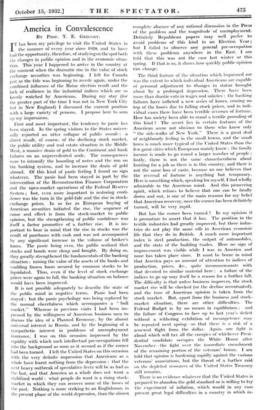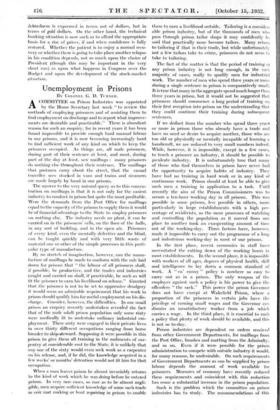America in Convalescence
. BY PROF. 'T. E. GREGORY.
IT haS been my privilege to Visit the United States in the summer of every year since 1928, and to have had the opportunity, therefore, of studying on the spot both the changes in public opinion and in the economic situa- tion. This-yearI happened to arrive in the country at the moment when the dramatic rise in the value of stock exchange securities was beginning. I left for Canada just as the tide was beginning to recede again, under the combined influence of the Maine- election result and the lack of resilience in the industrial indices which are so keenly watched by Americans. During my stay (for the greater part of the time I was not in New York City but in New England) I discussed the current position with a large variety of . persons. _I propose here to sum up my impressions.
First and most iniportafit, the 'tendency to panic has been stayed. In the spring visitors to the States univer- sally reported an utter collapse of public morale : a direct result, of course, of the declining stock market, the public utility and real estate situation in the Middle West, a massive drain of gold to the Continent and bank failures on an unprecedented scale. - The consequences were to intensify the hoarding of notes and the run on the banking system, and to increase the drain of gold abroad. Of this kind of panic feeling I found no sign WhateVer. The panic had been stayed in part by the intervention of the -Reconstruction Finance Corporation and the open market operations of the Federal Reserve System ; but, even more important in restoring confi- dence was the turn in the gold-tide and the rise in stock- exchange • prices. In so -far as Enropean buying of American securities initiated the rise, the sequence of cause and effect is from the stock-market to public opinion, but the strengthening of public confidence was itself a factor promotive of. a further rise. It is im- portant to bear in mind that the rise in stocks was the result of purchases with cash and was not accompanied by any significant increase in the volume of broker's loans. The panic being over, the public realized that stocks and bonds were cheap and bought. By doing so, they greatly strengthened the fundamentals of the banking situation : raising the value of the assets of the banks and enabling frozen loans secured by common stocks to be liquidated. Thus, even if the level of stock exchange prices were again to fall, the banking situation on balance would have been improved.
It is not possible adequately to describe the state of the public mind in negative terms. Panic had been stayed : but -the panic psychology was being replaced by the normal cheerfulness which accompanies a " bull market." Whereas in previous visits I had been im- pressed by the willingness of American business men to discuss the idea of a Planned Economy, by the almost universal interest in Russia, and by the beginning of a sympathetic interest in problems -of unemployment insurance; I was on this occasion impressed by the rapidity with which such intellectual pre-occupations fell into the background as soon as it seemed as if the corner had been turned. - I left the United States on this occasion with the very definite impression that Americans as a whole have learnt nothing from the depression : that the next heavy outbreak of speculative fever will be as bad as the last, and that America as a whole does not want a stabilized world : what people do want is a rising stock- market in which they can recover some of the losses of the past. Nothing is more striking to an Englishman, in the present phase of the world depression, than the almost complete absence' Or any -kational discussion in• the Press of the problem and - the Magnitude "of unemploynient. Definitely Republican papers may well prefer to avoid problems of • this kind in an Electioii Year ; but I failed to observe any general pre-occupation with these problems anywhere in the East. •• I am told that this was not the ease last minter Or this spring. If that is so, it shows how quickly public opinion can 'change. • • • ' The third feature of the situation which impresSed me was the extent to which individual Americans are capable of personal adjustment to changes 'in status brought about by 'a prolonged depresSion. There haVe been more than drastic cuts in wages and salaries: the banking failures have inflicted a new series of losses, coming on top of the losses' due to falling stock prices,' and in indi- vidual cases there haVe been terrible 'reverses of fortune. How has society been able to stand a terrific pounding of this kind ? The secret lies in certain features of the American scene not obvious to those, who know only " the side-walks of New 'York." There is a great deal of neighbourly feeling in the small towns, and the' small town is much more typical of the United States than the few great-cities which Europeank mainly know : the family income is Made to go round a larger"number of people : lastly, there is not the same shamefacedness about hunting for a job as there is in this country, Mid there is not the same loss of caste, because no one believes that the reversal of fortune is anything but temporary. Here is something which, speaking for myself, I find wholly admirable in the American mind. And this pioneering spirit, which refuses to believe that one can be finally down and out, is one of the main reasons for my belief that American recovery, once the corner has been definitely turned, will be very rapid.'
But has the corner been turned ? In my opinion it is premature to assert that it has. The poSition in the textile industries had greatly improved, but these indus- tries do not play the same role in AMerican economic life that they do in British. A much more important index is steel production, the output of automobiles, and the state of the building trades. Here no sign of improvement was visible while I was in America and none has taken -place since. It must be borne in mind that America pays an amount of attention to indices of production, prices, &c., quite incommensurate with that devoted to similar material here : a failure of the indices to go up may itself be a reason for a further fall. The difficulty is that unless business improves, the stock Market rise will be checked (or the decline accentuated), and the tone of American opinion is taken from the stock market. But, apart from the business and stock- market situation, there are other difficulties. The Federal Budget is by no means in equilibrium ; and the failure of Congress to face up to last year's deficit. without a withering exhibition of incompetence may be repeated next spring—so that there is a risk of a renewed flight from the dollar. Again, one fight is ahead which will tax all the energies of whichever Presi- dential candidate occupies the White House after NoVember—the fight over the immediate encashment of the remaining portion of the veterans' bonus. I am told that opinion is hardening rapidly against the various Veterans' associations, but the threat of a further raid on the depleted resources of the United States Treasury still remains.
There is no evidence whatever that the United States is prepared to abandon the gold standard or is willing to try the experiment 'of inflation, which would in any ease pr&.ent great legal difficulties in a country in which in- dehtedness is expressed in terms not of dollars, but in terms of gold dollars. On the other hand, the technical banking situation is now such as to afford the appropriate basis for a rise of prices, if and when confidence is fully. restored. Whether the patient is to enjoy a normal reco, very or whether there is going to take place another relapse in his condition depends, not so much upon the choice of President (though this may be important in the very short run) as upon what happens in Congress over the Budget and upon the development of the stock-market situation.



























































 Previous page
Previous page